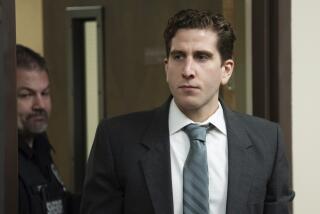Judge OKs TV System for Oklahoma City Bomb Trial
- Share via
DENVER — The judge in the Oklahoma City bombing case gave the go-ahead on Wednesday to televise the trial of Timothy J. McVeigh on a closed-circuit system in the city devastated by the blast--a move seen as a landmark victory for the nation’s growing victims-rights movement.
The decision by Richard P. Matsch represents the first time that the use of television has been approved in a federal criminal case. But Matsch, chief judge of the U.S. District Court in Denver, imposed several restrictions, including a ban on attendance by reporters.
Instead, the judge ruled that only those injured in the blast, their families and relatives of those who died in the explosion would be permitted inside the Oklahoma City auditorium where the feed of the trial, scheduled to start March 31, will be aired.
McVeigh and co-defendant Terry L. Nichols, who is to be tried separately at an unspecified later date, are charged with planning and carrying out the April 19, 1995, bombing of the Alfred P. Murrah Federal Building in which 168 people were killed and more than 800 injured.
Since the cases were moved to Denver last year because of concerns that the two men could not receive fair trials in Oklahoma City, Matsch has been under siege by thousands of those directly affected by the explosion.
The move to Colorado triggered deep angst among those worried that it would be too expensive to travel there and secure lodging during the trials, and they have been demanding televised access to the proceedings.
The ruling on Wednesday was greeted as a vindication of these efforts.
“I’m extremely pleased today,” said Janet Walker, whose husband, David, was killed at his job in the Murrah building’s Housing and Urban Development Department office. She said that as a result of the decision, “I will be in a courtroom situation,” even if she cannot travel to Denver.
Marsha A. Kight, whose daughter died in the Social Security office, said “all we are asking is that our rights be considered too.”
Matsch acted under authority of anti-terrorism legislation passed by Congress last year, which included a provision pushed both by victims in the Oklahoma City bombing and victims-rights groups across the nation.
The law mandates closed-circuit telecasts of federal trials when a trial is moved far from where the crime occurred.
Matsch, however, could have found that the law was unconstitutional or that it was impractical to carry out in McVeigh’s case. But he said from the bench Wednesday that “we’ll try to make it work.”
Under plans outlined by the judge, the trial will be televised in an auditorium that seats 330 people at a Federal Aviation Administration complex at the Oklahoma City airport. He will appoint a “special master” to preside there and to maintain the same decorum he insists upon in his own courtroom.
McVeigh’s lawyers raised no objections about the plan to televise the case. Attorneys for Nichols, however, have expressed mixed feelings about having a similar system during his trial.
But in an unusual move late last week, Nichols wrote a letter from his jail cell, saying he believes that victims “do have a right to view/sit in on my trial,” especially if that can help them “get some peace of mind and/or relief of pain.”
“They were totally innocent victims,” Nichols wrote, “given no warning, and were unexpectedly subjected to an event that should never have happened.”
In another development Wednesday, the government acknowledged that “John Doe No. 2,” once believed to have been part of the bombing, had no connection to it. In papers filed with the court, prosecutors said the man was an Army soldier stationed at Ft. Riley, Kan., who a witness mistakenly linked to McVeigh.
More to Read
Sign up for Essential California
The most important California stories and recommendations in your inbox every morning.
You may occasionally receive promotional content from the Los Angeles Times.














